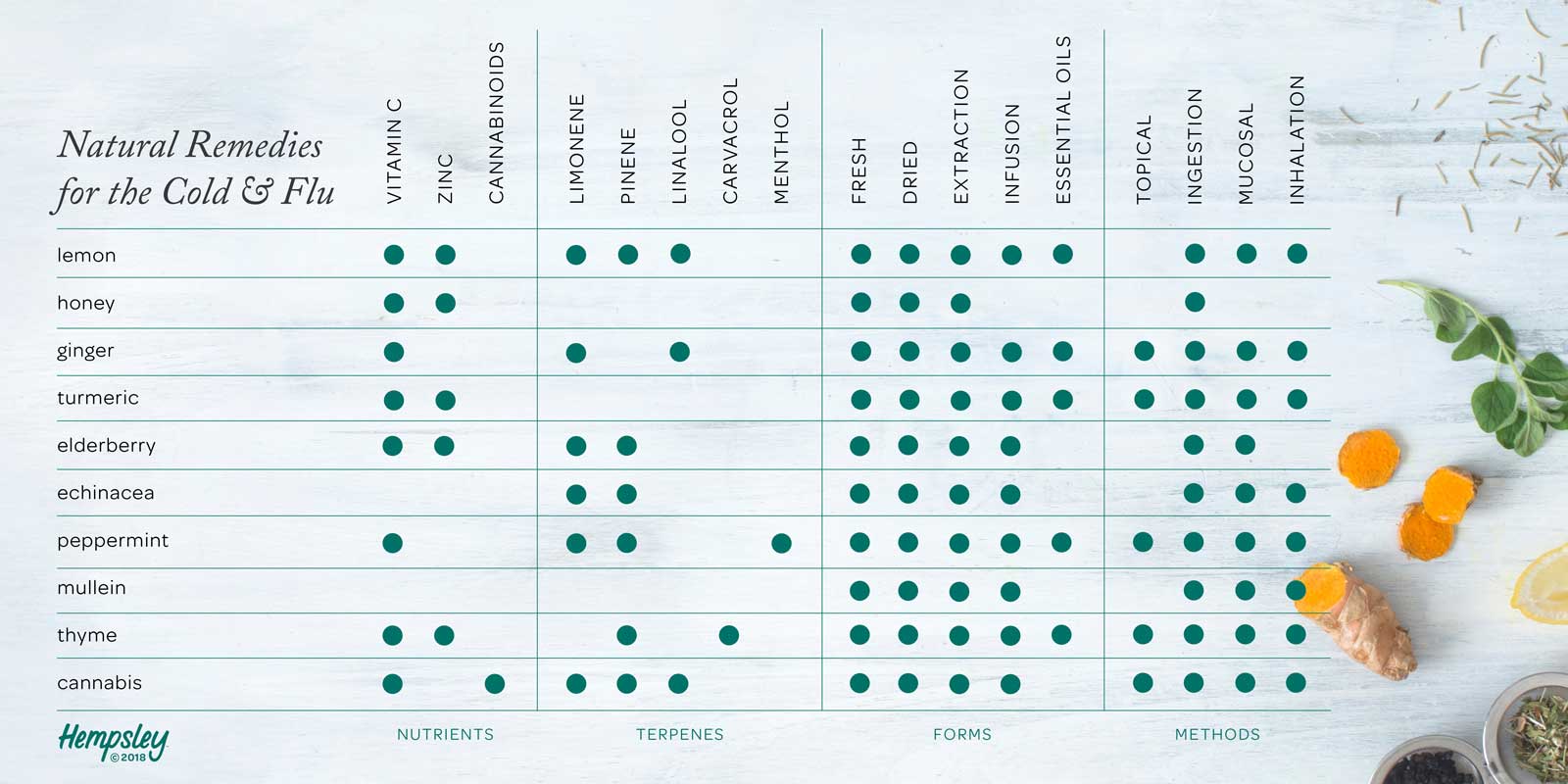Cannabinoids & Cannabis — with antiviral terpenes limonene, linalool, pinene
Here's more about the Cannabis herb:
-
About: supports the immune system and has anti-inflammatory and expectorant properties. Has a variety of terpenes, depending on the strain. Below are strains that typically have the three anti-viral terpenes we focus on at Hempsley. If your dispensary doesn't typically provide a list of terpenes in their strains, check out this article to learn how you can start identifying terpenes on your own with just your nose!
-
Limonene: OG Kush, Super Lemon Haze, Tangie, Durban Poison, Jack Herer, Berry White (source: Leafly)
- smells like: citrus fruits, sweet, tangy, bitter
-
Pinene: Jack Herer, Chemdawg, Bubba Kush, Romulan, Blue Dream, Strawberry Cough (source: Leafly)
- smells like pine, rosemary
-
Linalool: Amnesia Haze, Lavender, Purple Kush (source: Leafly)
- smells like: lavender, floral, sweet
-
To use:
- tea
- pour 1 cup boiling water over 1 tsp dried and ground cannabis flower in a tea bag or ball and steep for 10 minutes. Note: because the cannabinoid THC needs to bind to fat in order to cause intoxication, cannabis tea will not get you "high" unless you add a cannabis-infused fat, such as butter or coconut oil, to your tea
- tinctures, tablets, and capsules
- check the bottle label for dosing information (At Hempsley, we typically use a starting dose of 5-10mg of cannabinoids)
- inhalation
- vaporize dried cannabis flower or extracts: vaporization heats the cannabis enough to allow beneficial compounds to be released without creating a harmful combustion and smoke — learn more about vaporizing vs smoking here
- add fresh or dried herbs to a facial steam
- Safety:
|
Water
- Water helps regulate our body temperature, carry nutrients to their proper places, and aid in digestion, circulation, and lots more, so it's important that we get enough to allow our body to do those jobs. When we’re sick, it also keeps mucus from becoming too thick and uncomfortably clogging our airways.
|
Zinc
-
Studies have shown that zinc can help reduce the length of a cold, but some sources warn that zinc tablets or lozenges can have negative side effects such as vomiting, stomach cramps, diarrhea, and even losing your sense of smell.
-
To get a little extra zinc without the risk of these negative effects, we prefer to avoid zinc supplements and instead eat foods high in zinc such as beef, chicken (chicken noodle soup, yum!), oatmeal, almonds, cashews, chickpeas, and kidney beans.
|
Vitamin C
- May help protect the immune system and helps fight off infections, although there is growing evidence that it does not boost the immune system (Learn more here)
-
Studies show that taking Vitamin C at the onset of a cold can reduce the length of your cold.
- Natural sources of Vitamin C include lemons, strawberries, oranges, raspberries, pineapple, kiwi, grapefruit, kale, spinach, and lots more.
|
Honey
- About: a powerful anti-inflammatory. When drank, honey coats the back of the throat and can reduce swelling and pain. It also has anti-bacterial properties that can help kill any unwanted germs that could be causing a sore throat.
- To use: add anywhere from 1 tsp - 1 tbsp honey to your tea
- Safety:
- Never give honey to a child under 1 year old
|
Lemon — with antiviral terpene limonene
|
Echinacea — with antiviral terpene limonene
- About: one of the most studied herbal medicines, it supports the immune system by increasing antibodies and interferon levels (a compound released by the body when a virus enters the system to help fight off disease) and even stimulating white blood cells to work harder in order to fight off infection. Has the terpene limonene.
- To use:
- tea
- pour 1 cup boiling water over 1-2 tsp dried echinacea in a tea bag or ball and steep for 10 minutes. Drink 1 cup 2-4 times per day
- tincture
- tablets or capsules
- check the bottle label for dosing information
- inhalation
- add dried herbs to a facial steam
- Safety:
- Use caution if you have an autoimmune condition or are taking medications such as itraconazole (for fungal infections), lovastatin (for lowering cholesterol), fexofenadine (for allergies), or birth control
- Use caution if you have allergies to plants in the Asteraceae (daisy) family
- Some people experience mild stomach upset or dizziness
- High doses can cause nausea
|
Elderberry — with antiviral terpene limonene
- About: a gentle herb with a pleasant berry taste that supports the immune system with anti-inflammatory, antiviral, and antioxidant properties. Has the terpene limonene.
- To use:
- tea
- pour 1 cup boiling water over 1 tsp dried elderberries in a tea bag or ball and steep for 5 minutes. Drink 1 cup 2-4 times per day, not exceeding more than a few days at a time
- syrup or juice
- add 1 tsp elderberry syrup or juice (typically available at your local natural grocery store) to beverages
- lozenges
- check the label for dosing information
- Safety:
- Do not eat unripe berries or products made from other parts of the elder plant, as they contain dangerous compounds
- Use caution if you have an autoimmune disease
|
Thyme — with antiviral terpenes carvacrol, linalool, pinene
- About: is antispasmodic and an expectorant, meaning that it calms coughs and clear mucus. It also has antibacterial and antiviral properties and can boost the immune system. Has the terpene carvacrol, which is also found in oregano.
- To use:
- tea
- fresh thyme: pour 1 cup boiling water over 3 tsp fresh thyme leaves in a tea bag or ball and steep for 10 minutes. Drink 2-3 times per day
- dried thyme: pour 1 cup boiling water over 1.5 tsp dried thyme leaves in a tea bag or ball and steep for 10 minutes. Drink 2-3 times per day
- tincture
- tablets, capsules, or syrups
- check the bottle label for dosing information
- sore throat spray
- put thyme tea into a small spray bottle and mist the back of your throat to alleviate pain
- topically
- add 1-2 drops of thyme (or oregano) essential oil to 1 tsp carrier oil and dab or roll onto bottoms of feet (our feet have bigger pores than other areas of our bodies, making it easier for our bodies to absorb the essential oil)
- inhalation
- add 1-2 drops of thyme essential oil to your diffuser (Use discretion; everyone who comes into contact with the room will be dosed so make sure there aren't any safety concerns. Pets can also be particularly sensitive to essential oils)
- add fresh or dried herbs to a facial steam
- Safety:
- Generally considered safe, especially when consumed as tea
- Do not use while pregnant
- Use caution if you have a thyroid condition, diabetes or low blood sugar, irregular blood pressure, bleeding disorder, or hormonal disorder
|
Peppermint — with antiviral terpene limonene
- About: contains menthol, which supports the respiratory system by thinning and loosening mucus. Menthol can also relieve a stuffy nose and coughing. Has the terpene limonene.
- To use:
- tablets or capsules
- 500-1000 mg dried peppermint leaf taken 2-3 times per day, best taken with meals
- tea
- pour 1 cup boiling water over 1 tsp dried peppermint leaves (or 6-8 fresh leaves) in a tea bag or ball and steep for 10 minutes. Drink 2-3 times per day after meals
- sore throat spray
- mix 1-2 drops of quality peppermint essential oil with 1 oz of your carrier oil of choice (we used olive oil) in a small spray bottle; spray onto back of throat for pain
- lozenges
- look for lozenges that contain 5-10 mg menthol (do not give menthol products to children under 2 years old)
- inhalation
- add 1-2 drops of peppermint essential oil to your diffuser (Use discretion; everyone who comes into contact with the room will be dosed so make sure there aren't any safety concerns. Pets can also be particularly sensitive to essential oils)
- add fresh or dried herbs to a facial steam
- Safety:
- Do not give to children under 2 years
- Peppermint can worsen heartburn; do not use if you are taking the heartburn drug cisapride (Propulsid)
- Do not use while pregnant
- Do not use if you have gallbladder inflammation, severe liver damage, biliary duct problems, gastroesophageal reflux disease (GERD), or hiatal hernia
|
Ginger — with antiviral terpene limonene
- About: stimulates and activates the immune system. Ginger is also a great anti-inflammatory and can calm nausea. Has the terpene limonene.
- To use:
- tablets or capsules
- take 250-500 mg 2-3 times per day
- tea
- fresh ginger: finely slice or grate approximately 1 inch of freshly peeled ginger. Place in saucepan with 2 cups of water on low heat for 15 minutes. Drink 1-3 cups per day for coughs and colds
- dried ginger: pour 1 cup boiling water over 1/2 tsp dried ginger root in a tea bag or ball and allow to steep for 10 minutes
- inhalation
- add 1-2 drops of thyme essential oil to your diffuser(Use discretion; everyone who comes into contact with the room will be dosed so make sure there aren't any safety concerns. Pets can also be particularly sensitive to essential oils)
- add fresh or dried herbs to a facial steam
- Safety:
- Pregnant women should not take more than 1 gram of dried ginger per day
- Can cause mild heartburn in some people
- Generally considered safe for people of all ages, even children and the elderly
- Don't use in high doses if you are using blood thinners
|
Turmeric — with antiviral terpene limonene
- About: a fantastic anti-inflammatory and antioxidant. Has the terpene limonene.
- To use:
- tablets or capsules
- 2-3 grams of turmeric per day
- tea
- pour 2 cups boiling water over 1 tsp turmeric in a tea bag or ball and steep for 10 minutes
- Safety:
- Eating turmeric is considered very safe
- Some people may experience indigestion when using large amounts of turmeric
|
Mullein
- About: soothes irritated lung and throat tissues by coating them with a thin film. Has anti-inflammatory, expectorant, antiviral, and antibacterial properties.
- To use:
- tea
- pour 2 cups boiling water over 1 tbsp dried mullein leaf in a tea bag or ball and steep for 10 minutes. Drink 1 cup 2-4 times per day
- tincture
- infused oil
- a classic way to use mullein is by infusing it with olive oil and then using for ear infections by placing 3-4 drops in the ear every few hours. You can also put it in a small spray bottle and spray it on the back of the throat to alleviate pain
- learn how to infuse oils here
- inhalation
- add dried herbs to a facial steam
- Safety:
- Do not use while pregnant or breastfeeding
- Never use mullein seeds; they are toxic
|






















